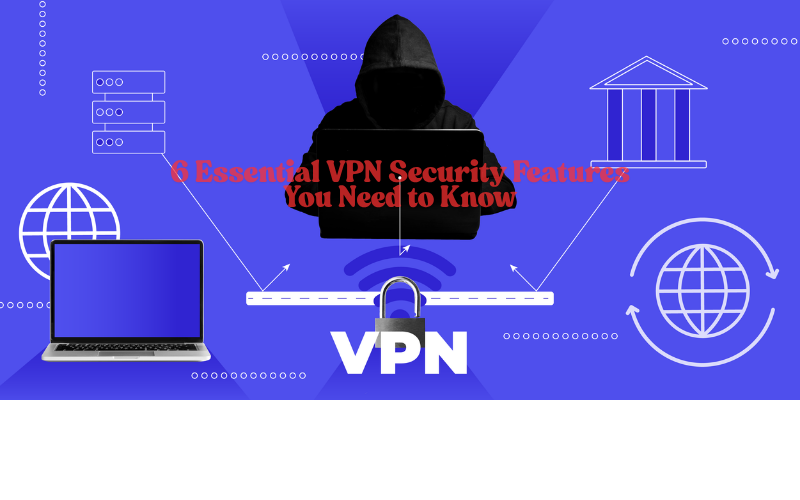Introduction
VPN security featuresAs our lives become increasingly connected to the digital world, protecting your online presence has never been more important. Cyberattacks, privacy breaches, and government surveillance are now everyday risks. Simply connecting to the internet without protection can leave your personal information exposed. That’s where a VPN comes in — but not all VPNs offer the same level of protection.
To truly safeguard your privacy, you need a VPN that offers strong and comprehensive security measures. In this article, we’ll dive into six critical VPN security features you should look for to ensure your online activities remain private, secure, and anonymous.
1. Strong Encryption Protocols
One of the most fundamental VPN security features is robust encryption. Without proper encryption, your data is vulnerable to interception by hackers, ISPs, or even government agencies. Leading VPN services utilize AES-256 encryption, often referred to as military-grade encryption, which is currently the gold standard for online security.
AES-256 is virtually unbreakable with today’s technology, meaning your emails, financial information, and personal messages are shielded from prying eyes. Whether you’re accessing public Wi-Fi at a café or browsing at home, strong encryption is your first line of defense against cyber threats.

2. No-Logs Policy
Another cornerstone of strong VPN security features is a strict no-logs policy. A no-logs VPN promises not to track or store your browsing history, connection timestamps, IP addresses, or any identifying data.
This is crucial because even the most secure VPN server becomes a vulnerability if it stores sensitive user information. In the wrong hands, those logs could be used to track your activities. By using a VPN with a transparent, audited no-logs policy, you ensure that your online actions stay truly private — even from your VPN provider itself.
3. Kill Switch
A kill switch is a vital, often overlooked feature that enhances your online security. Imagine your VPN connection drops for just a second — without a kill switch, your device could automatically reconnect to the internet via your unsecured local network, exposing your IP address and data.

A kill switch prevents this by immediately cutting off your internet access the moment the VPN connection is interrupted. It ensures that your true identity is never accidentally revealed, maintaining a consistent shield of protection around your online activities.
4. DNS Leak Protection
Even with a VPN active, DNS leaks can occur if your device mistakenly sends DNS queries outside the secure VPN tunnel. This can happen due to improper network settings or software flaws and could expose your real IP address, defeating the purpose of using a VPN.
DNS leak protection ensures that all DNS requests are routed through the encrypted tunnel to the VPN’s private DNS servers. It prevents leaks and ensures that your browsing history, location, and online identity remain hidden from ISPs, advertisers, and government agencies.

5. Secure VPN Protocols
The protocols a VPN uses directly affect its speed, stability, and security. Modern, secure protocols like OpenVPN, WireGuard, and IKEv2/IPSec are designed to provide the best balance between performance and protection.
Older protocols like PPTP are now considered outdated and vulnerable to attacks.
Choosing a VPN that supports cutting-edge, secure protocols means you’ll enjoy fast connection speeds for streaming or gaming without compromising your online security. Always check which protocols your VPN provider offers before subscribing.

6. Multi-Factor Authentication (MFA)
Finally, even the best encryption and privacy policies can’t protect you if your VPN account is compromised. That’s why multi-factor authentication (MFA) is a must-have security feature.
With MFA enabled, logging in to your VPN account requires more than just a password — usually a secondary verification step like a one-time code sent to your phone or an authentication app. This makes it far harder for hackers to gain unauthorized access, even if they manage to steal your password.
Multi-factor authentication adds a powerful extra layer of security to your online identity, making it an essential part of modern VPN security features.

Conclusion
Choosing a VPN is about more than just bypassing geographic restrictions or unlocking streaming content — it’s about protecting your personal data, privacy, and digital freedom.
By ensuring your VPN has strong encryption, a strict no-logs policy, a reliable kill switch, DNS leak protection, secure protocols, and multi-factor authentication, you give yourself the best possible defense against cyber threats.
When shopping for a VPN service, always prioritize these essential VPN security features to ensure you’re truly secure online. With the right VPN, you can browse, stream, and work without fear, knowing your information stays private and protected.

